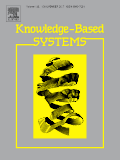Editors, Aims & Scope
Fuzzy partitioning for clinical DSSs using statistical information transformed into possibility-based knowledge
Principal Association Mining: An efficient classification approach
The creation and management of organizational knowledge
Multiple attribute consensus rules with minimum adjustments to support consensus reaching
A fuzzy logic model for forecasting exchange rates
Combination of interval-valued belief structures based on intuitionistic fuzzy set
A fuzzy inhomogenous multiattribute group decision making approach to solve outsourcing provider selection problems
Exploiting diversity for optimizing margin distribution in ensemble learning
ForesTexter: An efficient random forest algorithm for imbalanced text categorization
Ontology-aware prediction from rules: A reconciliation-based approach
Class-based tag recommendation and user-based evaluation in online audio clip sharing
A hybrid approach to self-management in a pervasive service middleware
Feature selection via neighborhood multi-granulation fusion
A probability model for key analysis in music
Evaluating Case-Base Maintenance algorithms
Fast data-oriented microaggregation algorithm for large numerical datasets
Optimistic Stackelberg solutions to bilevel linear programming with fuzzy random variable coefficients
Crisscross optimization algorithm and its application
Development of a knowledge-based system for cogeneration plant design: Verification, validation and lessons learned
Modeling of a semantics core of linguistic terms based on an extension of hedge algebra semantics and its application
An extended TOPSIS model based on the Possibility theory under fuzzy environment
A new BRB based method to establish hidden failure prognosis model by using life data and monitoring observation
Tuning extreme learning machine by an improved artificial bee colony to model and optimize the boiler efficiency
Item-based top-N recommendation resilient to aggregated information revelation
An empirical evaluation of similarity measures for time series classification
Discovering statistically non-redundant subgroups
A non-parametric feature assessment mechanism by identifying representative neighbors for image clustering
Boosting instance selection algorithms
A probabilistic approach to mitigate composition attacks on privacy in non-coordinated environments
Multi-level thresholding using quantum inspired meta-heuristics
MGR: An information theory based hierarchical divisive clustering algorithm for categorical data
Topic knowledge map and knowledge structure constructions with genetic algorithm, information retrieval, and multi-dimension scaling method
TPLUFIB-WEB: A fuzzy linguistic Web system to help in the treatment of low back pain problems

